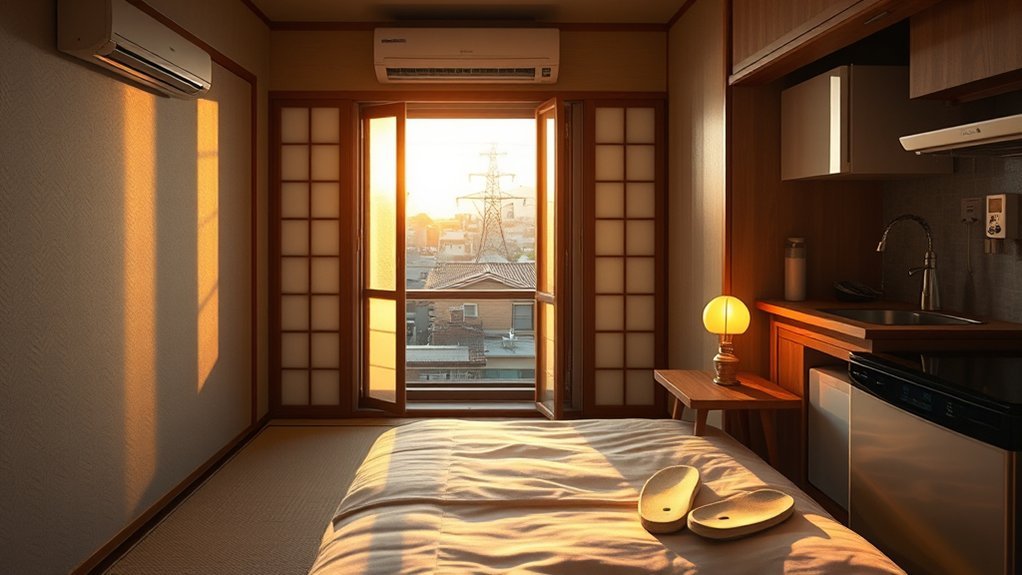You’ll typically spend ¥120,000–¥320,000 per month living in Japan, with rent driving most of the difference between big cities and smaller towns. In Tokyo expect central one-room rents near ¥100,000 plus utilities of about ¥13,000, while regional cities can average ¥50,000–¥70,000 for similar units. Groceries for one run ¥20,000–¥30,000, transit fares start around ¥150, and basics like mobile and internet add ¥2,000–¥4,500. Keep going to see detailed breakdowns and saving tips.
Housing and Utilities: What to Expect and How Much You’ll Pay

If you’re moving to Japan, expect housing costs to vary widely by location and type: a one-room in central Tokyo typically starts around ¥100,000/month while nationwide averages for similar units run ¥50,000–¥70,000. Guesthouses often lower and include utilities, and you should budget about ¥13,000/month for a single person’s utilities (¥7,000 of that for electricity) or roughly ¥25,730 for basic utilities in an 85 m² apartment.
Note rents spike January–March due to seasonal demand. You’ll compare average monthly rent across regions: central Tokyo is a premium outlier, while other cities and suburbs follow nationwide averages. Guesthouses reduce upfront costs and simplify billing by bundling utilities.
For a single person, plan monthly costs that combine rent and utilities, and factor in electricity as the largest variable. Monitor the rental market cycle to avoid peak-season premiums, and weigh trade-offs between space, commute time, and utility consumption when choosing between apartment types and guesthouses.
Food, Groceries, and Eating Out: Daily Costs and Saving Tips

While food costs vary by lifestyle and city, you can expect single-person groceries to run about ¥20,000–¥30,000 monthly and couples ¥50,000–¥80,000, with cheap restaurant meals and teishoku lunches typically around ¥1,000 and budget options like ramen, soba, udon, or curry often priced ¥500–¥1,000—so balancing home cooking with selective eating out is the quickest way to control your monthly food bill. You’ll track daily costs by comparing supermarkets, convenience stores, and inexpensive restaurants. Buy seasonal vegetables and seafood at local markets, shop near closing time for discounts, and bring reusable bags to avoid charges. Eat cheaply by favoring teishoku or ramen shops and limiting premium dining.
| Category | Typical Price | Saving Tips |
|---|---|---|
| Groceries (single) | ¥20,000–¥30,000/mo | Buy seasonal, bulk staples |
| Inexpensive restaurants | ¥500–¥1,000/meal | Choose lunch sets, loyalty cards |
Transportation and Connectivity: Trains, Phones, and Internet

Because Japan’s public transport is dense and punctual, you’ll find trains, subways, and buses cover most travel needs with fares starting around ¥150 (≈$1.26) and convenient IC cards like Suica and Pasmo that speed boarding and transfer between operators.
You’ll rely on frequent train stations and integrated schedules, making public transportation an affordable transportation backbone versus owning a car. Expect taxi fares to start near ¥590 ($5.10) for short rides, useful late-night or luggage-heavy trips.
For connectivity, mobile phone plans span roughly ¥2,000–¥6,000 monthly prices depending on carrier and features; getting a conventional SIM typically requires a residence card and Japanese bank account.
Home internet options include pocket Wi-Fi at about ¥3,500/month and broadband services averaging ¥4,500/month for unlimited data. Compare discount mobile operators and bundled broadband services to cut costs.
Daily Essentials, Entertainment, and Services: Shopping, Gyms, and Haircuts

After you’ve sorted transport and connectivity, you’ll want a clear picture of everyday living costs for groceries, dining, personal care, fitness, and household items.
For daily essentials, grocery costs for a single typically run ¥20,000–¥30,000/month; couples often spend ¥50,000–¥80,000. Shopping is practical: 100 Yen Shops cover basics, while Muji and Nitori handle furniture and larger items, keeping replacement costs low compared with many Western cities.
Dining out stays affordable—500–1,000 yen for cheap meals, 1,000–3,000 yen at average restaurants—so occasional eating out won’t blow your budget relative to grocery costs.
Haircuts start around ¥4,000, though quick cuts can be as cheap as ¥1,000 if you accept no-frills service.
Gyms average ¥8,546/month, giving access to clean, well-equipped facilities; boutique studios cost more.
Entertainment expenses vary, but with modest dining out and budget shopping you can control overall living costs. These figures help you estimate the average cost of living and plan realistic monthly budgets.
Budget Examples by City and Lifestyle: Tokyo Vs Smaller Cities

If you’re weighing where to live, compare Tokyo’s roughly ¥318,000/month average for a single with smaller cities like Gifu at about ¥123,000/month: the gap is driven mostly by rent—central Tokyo 1-room units often start near ¥100,000 versus around ¥58,500 in smaller cities—while utilities stay similar (~¥13,000).
Dining and lifestyle choices push daily costs higher in Tokyo, and transport passes run about ¥1,000 monthly in the capital versus typically lower fares outside it.
You should model monthly living costs in Japan by splitting fixed and variable expenses. For a single person in Tokyo assume: rent ¥100,000, utilities ¥13,000, public transportation ¥1,000, groceries and dining out ¥80,000, other ¥124,407 = ¥318,407.
In a smaller city use: rent ¥58,470, utilities ¥13,000, transport ¥500, groceries and dining out ¥30,000, other ¥20,000 = ~¥123,970.
This comparative, data-driven breakdown shows how rent and dining out mainly drive the Tokyo premium.
Frequently Asked Questions
How Much Money Do You Need to Live Comfortably in Japan?
You’ll need about ¥217,746–¥649,018 monthly depending on lifestyle; cost of living includes housing expenses, utility bills, food prices, transportation costs, healthcare fees, education expenses, entertainment budget, savings expectations, and lifestyle choices for comparison.
Is It Cheaper to Live in Japan or the US?
Short answer: Japan’s generally cheaper. Like aSharper pencil, your cost comparison shows lower living expenses—housing prices, grocery costs, utility bills often fall, transportation fees vary, healthcare expenses and entertainment options depend on salary differences and lifestyle choices.
Is $5000 Enough for a Week in Japan?
Yes — you can stretch $5,000 for a week in Japan: prioritize Accommodation Prices, Dining Costs, Transportation Fees, Shopping Expenses, Tourist Attractions, Entertainment Budget, Local Experiences; track Travel Expenses, Currency Exchange and use strict Budgeting Tips.
Can I Live on $2000 a Month in Japan?
Yes — you can, but note Tokyo averages 318,407 yen; Cost breakdown: Housing expenses, Food prices, Transportation costs, Utility bills, Healthcare fees, Entertainment budget, Savings potential, Lifestyle choices vary by Regional differences, so compare and prioritize.
Conclusion
Living in Japan can be affordable or pricey depending on choices: Tokyo’s rent often doubles smaller-city rates, groceries vary 10–30% by region, and rail passes beat taxis for daily commutes. You’ll spend more on convenience, less by cooking and using regional trains. Compare utilities, phone plans, and lifestyle to trim costs—cutting subscriptions and choosing local markets saves hundreds monthly. In short, weigh trade-offs and you’ll get bang for your buck.


